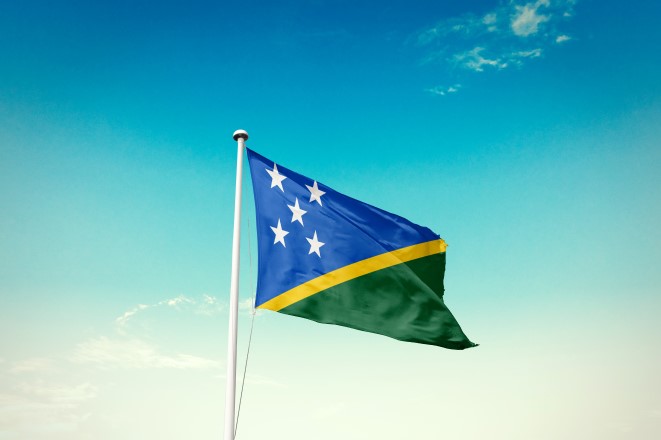
As the Pacific Island nation heads to the polls today (17 April), the Daily Update considers the significance of China to this election, as well as the collective power of the Pacific Island Forum.
Election
For a small nation, Solomon Islands’ election raises some big questions.
The 720,000-strong nation has developed deeper ties with China, raising concerns about the latter’s intentions in the Pacific amid its increasing aggression in the South China Sea.
Under incumbent Manasseh Sogavare – who is seeking a fifth term as prime minister (PM) having served sporadically throughout the noughties and 2010s – the country signed a controversial security pact with Beijing in 2022.
Since ceasing its diplomatic recognition of Taiwan in 2019 – the year Sogavare was elected for the fourth time – the Solomon Islands has been receiving increasing infrastructure and development aid from China. As Bloomberg notes, this was also accompanied by increasing interest from the US and other traditional partners, such as New Zealand and Australia, to garner favour with the Solomons.
Researcher and author Edward Cavanough characterised the PM as “very adept… at playing each of these major and regional powers off each other to gain incredible concessions”.
Outside of the capital, Honiara, many people are without basic services like schools, medicine and transport. Securing a path towards economic development and aid is a key priority for candidates.
Chinese unease
However, opposition MPs have suggested they would back away from the security elements of the pact and are keen to ensure strong relations with traditional partners. The Solomon Islands Party for Rural Advancement (SIPRA) Gordon Darcy Lilo told the Guardian:
“We already have our existing regional security partners like Australia and New Zealand… We are not in war with anyone. All we need is our economic security.”
The United Party’s (UP) Peter Kenilorea Jr echoed this sentiment, telling the newspaper that Solomon Islands needs ties with both Taiwan and China while maintaining relationships with Australia and New Zealand.
Speaking to the FT, Mihai Sora, a former Australian diplomat to the Solomons and research fellow at the Lowy Institute, said a pro-China election outcome “could increase regional tension” among Pacific islands.
Voters don’t directly select an PM. Instead, elected MPs attempt to form a ruling coalition, choosing a new PM from among their ranks. Currently, Sogavare faces another four candidates to retain his seat.
Pacific unity
The Solomon Islands is part of the Pacific Islands Forum Secretariat, which promotes the interests of the Pacific Islands to the World Trade Organization (WTO). Based in Fiji, with a Geneva office, the Secretariat comprises 16 island nations. This includes developed nations such as Australia and New Zealand, but predominantly addresses the needs of smaller, less developed nations, such as the Cook Islands, Marshall Islands, Samoa, Palau, Papua New Guinea, Tonga, Tuvalu and Vanuatu.
In 2004, a Pacific Islands Forum gathering led to the creation of the Pacific Plan, which established long-term goals to encourage cooperation between members on aspects of trade – such as shipping and fisheries – as well as other economic objectives like improving island aviation.
The 53rd Pacific Islands Forum Leaders’ Meeting launched last week. Held in Tonga this year, delegates addressed issues around building resilience. Tongan PM Hu’akavameiliku Siaosi Sovaleni said in opening remarks that “we must build resilience into everything that we do”.
“How we address the impacts climate change and environmental degradation, how we build our economies through collective solutions and how we build the capacity of our people through innovation and technology.”
Trade
The Solomon Islands primarily sells agricultural products internationally according to the Observatory of Economic Complexity (OEC), with rough wood its leading export, outstripping the second-largest export, processed fish, by five times at a value of US$308m.
Palm oil ($37.5m) and coconut oil ($14.7m) were also in the nation’s top five, while gold came in at $22.4m.
China is both the country’s largest import and export partner, with bilateral trade worth $456m in 2022.
According to UNCTAD, services exports have grown over the 21st century, standing at $70m in 2022, compared to $41m in 2005, though this reflects a significant fall from a 2015 peak of $105m. Travel services reflect this trajectory, although transport exports did grow between 2015 and 2022, from $25m to almost $40m.
UK-Solomon Islands trade
Trade between the UK and Solomon Islands was worth only £10m in the year up to September 2023, with the UK exporting £7m worth of goods and services, while importing £3m, per the Department for Business and Trade (DBT).
UK exports became entirely oriented towards sales of services in 2023, with sales of goods falling to negligible levels.
Similarly, exports fell substantially in the year to September 2023 – from £12m to £3m (a decrease of 75%). The Solomon Islands also pivoted towards services, with a third of its remaining exports (£1m) derived from services.
This fall in goods trade comes despite the Solomon Islands entering into a UK-Pacific economic partnership agreement (EPA), which came into effect in March 2022.
The EPA guarantees preferential market access for popular Solomon Island products like palm oil and cocoa beans. In 2023, provisions were also drawn up to extend the agreement to encompass preferential duties on fishery products.



